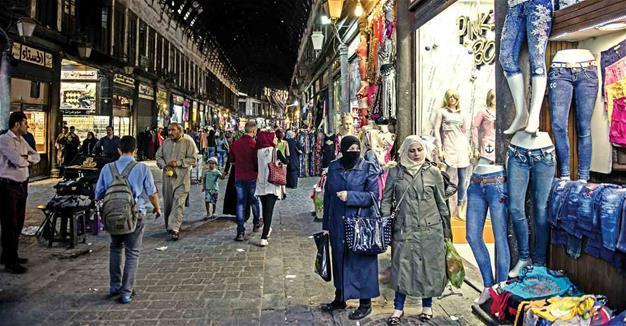Hope and despair on the streets of Damascus
Zeynep Bilgehan – DAMASCUS

Locals in Syria’s once vivid capital city of Damascus, which has been torn by a six-year-long civil war, are trying to stick to their daily lives and forget about the violence ongoing across the country.
“One cannot live while constantly thinking about war,” one local told daily Hürriyet in Damascus, where signs of war can still be seen despite efforts by the regime to clean them up.
Passengers crossing the border from Lebanon into Syria amid extraordinary security measures come across a huge poster of Bashar al-Assad.
There are checkpoints on the roads, junctions and entrances to streets in and around the city of Damascus, where middle-aged male soldiers along with young female soldiers are on duty.
Taking photographs is absolutely prohibited at the checkpoints.
From buffets to cafés, Syrian flags and photographs of al-Assad are everywhere.
Flags and sacks with United Nations logos on them also catch our eyes, as they were being used as roofs at checkpoints, curtains in stores and covers for cars.
Posters promoting a fair titled “Reconstruction of Syria” are also seen by the roads.
The war has made Syrians refugees not only in other countries but also within their own boundaries.
New residences for refugees are being built in Damascus, a city severely affected by internal migration.
Except for the speed bumps, however, there are no defects or cracks in roads that would make you slow down.
Tourists no longer comingAfter passing by posters celebrating the Syrian national football team, which qualified last week for the play-off round for the 2018 World Cup, we wander through the narrow streets of Bab Tuma, an old Christian neighborhood. The streets are crowded.
In the city center, around Souq al-Hamidiyah - Damascus’ old and largest marketplace named after Ottoman Sultan Abdulhamid II - security checks are much more frequent and soldiers patrol through them, but people try to stick to their daily lives in and around the marketplace as though there was no war going on. The cafés and shops are filled with people.
“My daughter learned Turkish by watching Turkish TV series,” said the owner of a jewelry store before calling his daughter to give her the good news that Turkish journalists came to their store.
“Many Turks used to come [to Damascus]. We are sad about the current situation because we are two different states but brotherly nations,” the owner said.
Noting that no tourist has come in the last three years, he said, “It has been six years [since the war began]. We cannot live while constantly thinking about war. We are looking at life.”
Traces of warDamascus is actually still a front in the war. There are checkpoints built on boulevards, near fancy buildings and around historical locations, together with security checks, flags and banners. You cannot even cross a street without permission and accompaniment. All vehicles, including the ones with soldiers inside, are being searched. Locals speak of a bombing or an attack wherever you go.
Priest Carlos, another resident of Damascus, from the Syriac Orthodox Church said half of the Christians in Syria have abandoned the country.
“I do not think that those who lost their families will return even if the war comes to an end. The sorrow belongs to everyone here. An explosion does not discriminate between Christians and Muslims,” he said.
Ahmed al-Abrahim, a journalist working for the Syrian state television channel, translates Turkish books into Arabic. According to al-Abrahim, the most popular Turkish writers are Aziz Nesin, Nazım Hikmet, Yaşar Kemal and Erdal Öz, and amongst young girls, Elif Şafak. Two years ago, al-Abrahim lost his son to a howitzer explosion. When asked about what will happen in Syria henceforth, he said, “Syria has been here for 7,000 years. We know how to rebuild.”
Regime employees remove debris of buildings destroyed in attacks in the city immediately, in a bid to boost the morale of residents, a hard task when the consequences of the war are considered.
“Once we used to ask for a better country, but then we were about to lose it completely,” said a local, claiming to be a former opponent to the regime.
“We had to postpone our demands for human rights and freedom,” the local said, complaining about rising corruption.
Nermin Shawki is a young musician who takes stage with a group of young dancers at a hotel in Damascus. She sings in Turkish and English.
“Every night when I get back home I thank god that I am still alive,” she said, while commenting on singing at times of war.
“But I have never thought of leaving here. Still, I would go if I found a better place to sing.”
 Locals in Syria’s once vivid capital city of Damascus, which has been torn by a six-year-long civil war, are trying to stick to their daily lives and forget about the violence ongoing across the country.
Locals in Syria’s once vivid capital city of Damascus, which has been torn by a six-year-long civil war, are trying to stick to their daily lives and forget about the violence ongoing across the country.